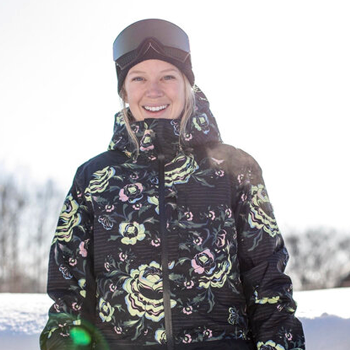Save A Brain: Nonprofit Shares Education, Resources and Compassion
One traumatic brain injury survivor advocates for thousands
By Jacqueline Leddy, Research Coordinator, Center for Traumatic Brain Injury Research

Brain, spreads awareness of the long-term
mental and physical effects of traumatic brain
injury and concussions.
The Utah-based nonprofit organization Save A Brain is quickly growing a follower base of more than 4,300 followers on Instagram as Founder Kelsey Boyer gains awareness as a resource for fellow brain injury survivors. In May 2020, Kelsey established Save A Brain Inc. with a mission to provide education, encourage prevention, and spread awareness of the long-term mental and physical effects of traumatic brain injury (TBI) and concussions.
Snowboarding has been and still is, a huge part of Kelsey’s life. She grew up in rural Pennsylvania before moving out west to chase bigger mountains and more snow. “I was competing with high hopes of going to the Olympics. I sustained about eight concussions over a two-month period and my brain started bleeding, but I had no idea,” said Kelsey. She recalled that all the doctors she saw just said, “You’re fine, you’re fine.” But she was not fine.
Her friends became concerned and finally took her to the emergency room for a computed tomography scan (CT scan). Afterward, she received her diagnosis: a subdural hematoma, which had been bleeding for about two weeks, and her brain had shifted 11 millimeters. The care team recommended emergency brain surgery.
Kelsey discussed how unprepared she was upon leaving the ICU after surgery. She was discharged with little information or warning about the debilitating symptoms she subsequently experienced, including mood swings, trouble sleeping, and problems with eye function.
Because of her experience, she now uses the Save A Brain website as a platform to advocate for and inform other survivors about daily steps they can take to encourage brain health and overall well-being. The website highlights helmet safety and offers a free recovery toolbox as well as information about treatment centers, yoga, meditation programs, and a concussion cookbook. One of Save A Brain’s long-term programs, Happy Helmets, donates new helmets to local charities, schools, and youth programs, selecting a new helmet sponsor and donor each month.
Three months post-surgery, Kelsey got back on her snowboard, but experienced flashbacks, which forced her to stop. She took a break, wondering if she would ever be able to continue the sport. With the help of treatments like psychotherapy, meditation, and yoga, she has since made a strong comeback and snowboards daily. She is once again chasing powder, riding through trees, and helping women riders gain confidence and skills on the mountain.
To learn more and listen to Kelsey’s story, visit saveabraininc.com.
